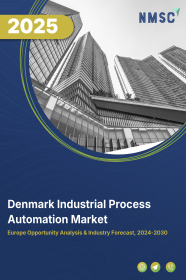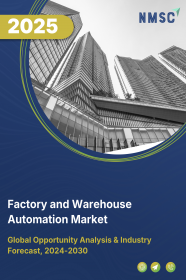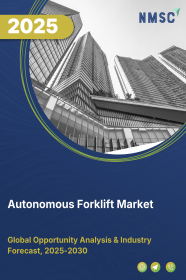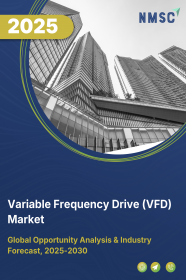
Denmark Industrial Process Automation Market by Component (MES [Hardware, Software, Services]; DCS [Hardware, Software, Services]; PLC [Hardware, Software, Services]; SCADA [Hardware, Software, Services]; Field Instruments; Industrial Robots; Human Machine Interface; Industrial PCs; Process Analyzers & Drives) and by End User (Oil & Gas, Chemicals & Refining, Energy & Power, Pulp & Paper, Metals & Mining, Pharma, & Others) – Global Opportunity Analysis and Industry Forecast, 2025–2030
Industry: Semiconductor & Electronics | Publish Date: 08-Oct-2025 | No of Pages: 159 | No. of Tables: 121 | No. of Figures: 66 | Format: PDF | Report Code : SE1027
Industry Outlook
The Denmark Industrial Process Automation Market was valued at USD 388.6 million in 2024 and is projected to grow to USD 406.1 million by 2025. Additionally, the industry is expected to continue its growth trajectory, reaching USD 446.4 million by 2030, with a CAGR of 2.34% from 2025 to 2030.
The market is benefiting from digital transformation and growing robotics adoption, which are key drivers of market expansion. The country’s investment in its digital growth strategy is accelerating the adoption of advanced automation solutions, enhancing operational efficiency and supporting data-driven decision-making across industries. Additionally, the implementation of robotics in manufacturing is boosting productivity and precision, as reflected by Denmark’s high robot density.
However, cybersecurity risks present a significant restraint, as companies’ increasing reliance on digital networks exposes them to potential cyber threats, hindering the broader adoption of automation. Looking ahead, the integration of artificial intelligence (AI) and machine learning (ML) offers promising opportunities for future growth, enabling predictive maintenance, optimizing production processes, and driving further innovation in Denmark’s industrial automation landscape
Digital Growth Drives the Denmark Industrial Process Automation Market Expansion
The ongoing digital transformation in Denmark is a key driver for the expansion of the industrial process automation market. As industries increasingly invest in digital infrastructure, the demand for automation solutions grows to improve operational efficiency, streamline processes, and support data-driven decision-making. According to the International Trade Administration (ITA) report from 2024, Denmark has committed USD 138 million to its digital growth strategy, which spans through 2027. This investment is poised to accelerate the adoption of advanced automation systems across various sectors, driving productivity gains, cost reductions, and market growth in the process automation industry.
Robotics Implementation Drives Manufacturing Efficiency
The growing adoption of robotics in Denmark’s manufacturing sector is another major factor propelling the Denmark industrial process automation market growth. Robots enhance production efficiency, precision, and flexibility, which reduces human error and accelerates production timelines. As industries seek to stay competitive, the integration of robotics is increasing. In November 2024, the International Federation of Robotics (IFR) reported that Denmark’s robot density reached 306 units per 10,000 employees in 2023, underscoring the widespread implementation of robotics. This growing trend reflects the crucial role of robotics in improving productivity and driving further automation across industries.
Cybersecurity Risks Restrain the Denmark Industrial Process Automation Market Growth
Despite these positive growth drivers, cybersecurity risks present significant challenges to the widespread adoption of industrial process automation in Denmark. As companies increasingly integrate automation systems with digital networks, the vulnerability to cyber threats such as data breaches and system weaknesses grows. These security concerns make businesses hesitant to adopt new technologies, creating barriers to the full-scale deployment of automation solutions and slowing down market expansion in the country.
AI and ML Integration Unlocks Future Growth in Industrial Process Automation
The integration of artificial intelligence (AI) and machine learning (ML) presents a significant opportunity for Denmark’s industrial process automation market. These technologies enable predictive maintenance, streamline repetitive tasks, and enhance real-time decision-making. AI and ML allow businesses to optimize production processes, reduce downtime, and improve product quality while minimizing human intervention. As AI and ML adoption grows, Denmark position itself as a leader in intelligent automation, driving productivity, precision, and innovation across various industries.
Competitive Landscape
The promising players operating in the Denmark industrial process automation industry include Siemens AG, ABB Ltd., Schneider Electric SE, Emerson Electric Co., Honeywell International Inc., Rockwell Automation, Inc., Yokogawa Electric Corporation, FANUC Corporation, Endress+Hauser AG, Beckhoff Automation GmbH & Co. KG, Phoenix Contact GmbH & Co. KG, Festo SE & Co. KG, KROHNE Messtechnik GmbH, Omron Corporation, and Nidec Industrial Automation, and others.
Denmark Industrial Process Automation Market Key Segments
By Component
-
Manufacturing Execution Systems
-
Hardware
-
Software
-
Services
-
-
Distributed Control Systems
-
Hardware
-
Software
-
Services
-
-
Programmable Logic Control
-
Hardware
-
Software
-
Services
-
-
Supervisory Control and Data Acquisition (SCADA)
-
Hardware
-
Software
-
Services
-
-
Field Instruments
-
Industrial Robots
-
Human Machine Interface
-
Industrial PCS
-
Process Analyzers & Drives
By End-User
-
Oil & Gas
-
Chemical & Refining
-
Energy & Power
-
Pulp & Paper
-
Metals & Mining
-
Pharma
-
Cement & Glass
-
Others
Key Players
-
Siemens AG
-
ABB Ltd.
-
Schneider Electric SE
-
Rockwell Automation, Inc.
-
Yokogawa Electric Corporation
-
FANUC Corporation
-
Endress+Hauser AG
-
Beckhoff Automation GmbH & Co. KG
-
Phoenix Contact GmbH & Co. KG
-
Festo SE & Co. KG
-
KROHNE Messtechnik GmbH
-
Omron Corporation
-
Nidec Industrial Automation
Report Scope and Segmentation
|
Parameters |
Details |
|
Market Size Value in 2025 |
USD 406.1 Million |
|
Revenue Forecast in 2030 |
USD 446.4 Million |
|
Value Growth Rate |
CAGR of 2.34 %from 2025 to 2030 |
|
Analysis Period |
2024–2030 |
|
Base Year Considered |
2024 |
|
Forecast Period |
2025–2030 |
|
Market Size Estimation |
Million (USD) |
|
Growth Factors |
|
|
Companies Profiled |
15 |
|
Market Share |
Available for 10 companies |
|
Customization Scope |
Free customization (equivalent to up to 80 working hours of analysts) after purchase. Addition or alteration to country, regional, and segment scope. |
|
Pricing and Purchase Options |
Avail customized purchase options to meet your exact research needs. |

















 Speak to Our Analyst
Speak to Our Analyst
























